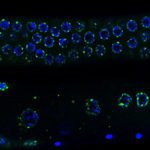Lien vers Pubmed [PMID] – 24912527
Lien DOI – 10.1017/S0031182014000845
Parasitology 2014 Aug; 141(9): 1148-55
Trypanosomiasis is caused by Trypanosoma species which affect both human and animal populations and pose a major threat to developing countries. The incidence of animal trypanosomiasis is on the rise. Surra is a type of animal trypanosomiasis, caused by Trypanosoma evansi, and has been included in priority list B of significant diseases by the World Organization of Animal Health (OIE). Control of surra has been a challenge due to the lack of effective drugs and vaccines and emergence of resistance towards existing drugs. Our laboratory has previously implicated Heat shock protein 90 (Hsp90) from protozoan parasites as a potential drug target and successfully demonstrated efficacy of an Hsp90 inhibitor in cell culture as well as a pre-clinical mouse model of trypanosomiasis. This article explores the role of Hsp90 in the Trypanosoma life cycle and its potential as a drug target. It appears plausible that the repertoire of Hsp90 inhibitors available in academia and industry may have value for treatment of surra and other animal trypanosomiasis.

